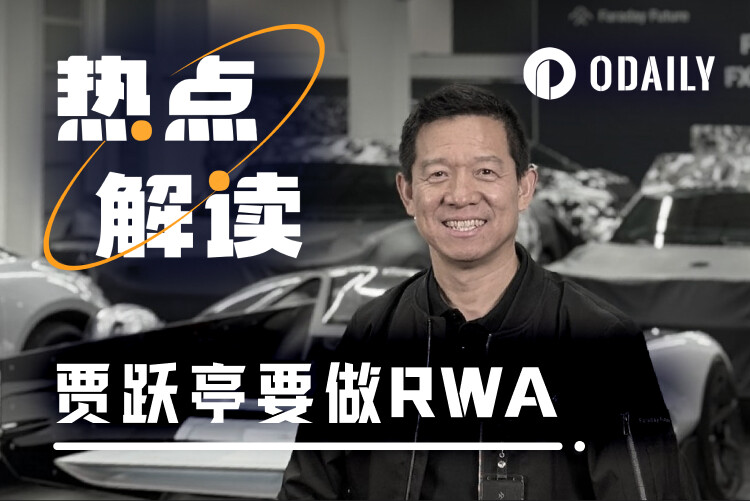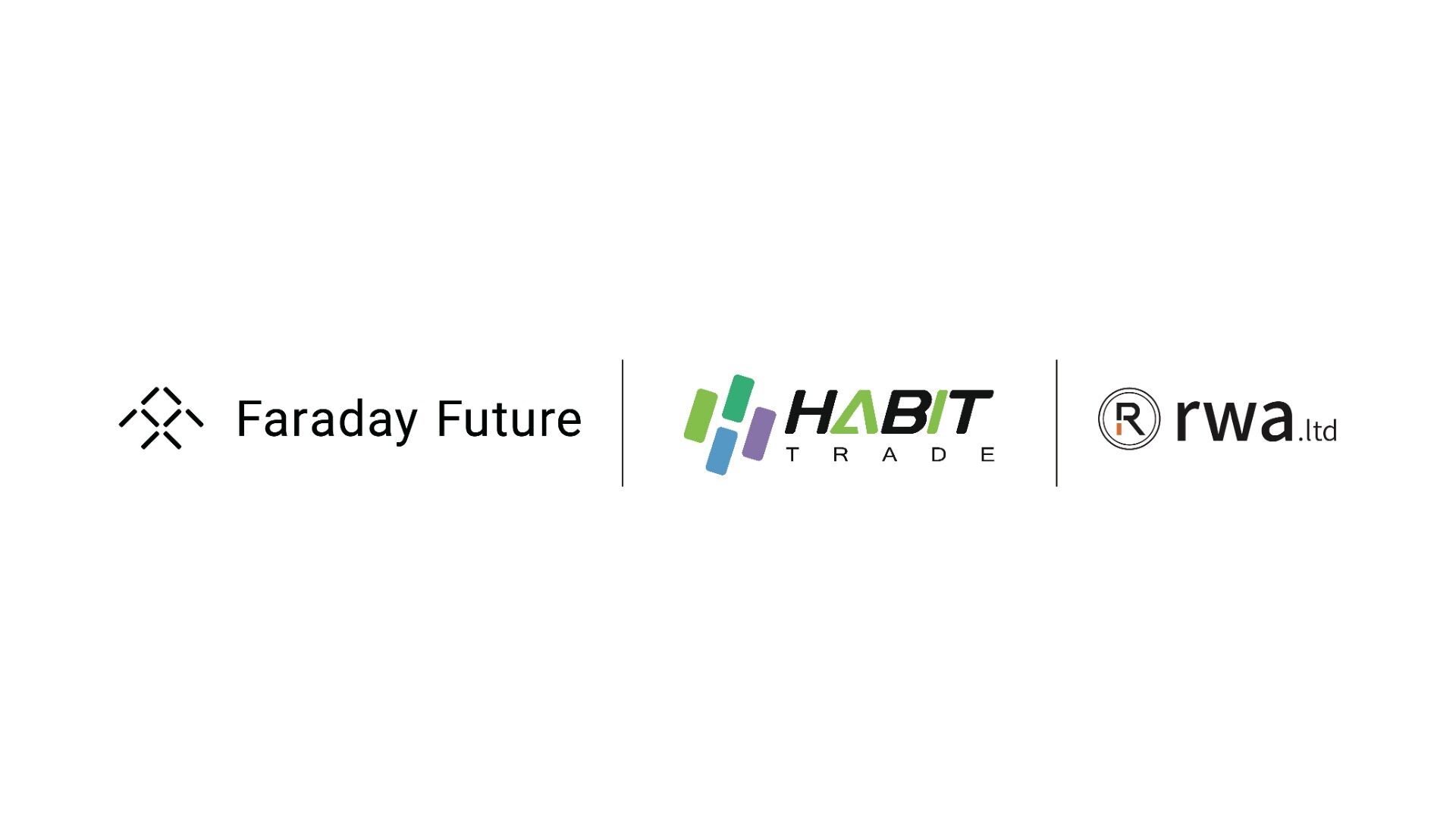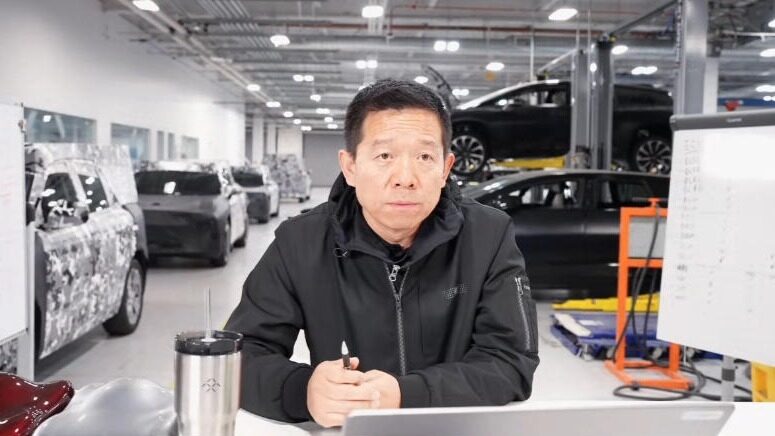A deep dive into Jia Yueting’s entry into RWA: Who is the new director behind the old actor?
- 核心观点:贾跃亭借RWA概念包装FF预订单融资。
- 关键要素:
- FF拟将1万份预订单代币化融资。
- 合作方HabitTrade提供稳定币通道。
- RWA Group负责金融包装设计。
- 市场影响:短期或引发投机热潮。
- 时效性标注:短期影响。
Original | Odaily Planet Daily ( @OdailyChina )
Author | Ethan ( @ethanzhang_web3 )

On July 17, when Jia Yueting stood on a rooftop parking lot in downtown Los Angeles, braving the afternoon sun and hot wind, talking to the camera about FF's latest electric car, the FX Super One, he might have already planned the next scene in his mind. Who would have thought that while the "car" was still floating in the air, Boss Jia's script had quietly turned the page to the Web3 ecosystem.
On July 22, FF Lightning announced a strategic partnership with digital asset infrastructure platform HabitTrade . Not to disappoint everyone, Boss Jia once again started the "concept output" mode, throwing out a dazzling series of puzzles of "EAI travel + Web3 + blockchain + encryption + stable currency" in one breath, and vowed to create a "value fusion monster" that connects "Web2 & Web3", "on-chain & off-chain", "reality & virtuality". It is indeed a grandmaster-level speech in the PPT entrepreneurial world.
RWA is not something you can do just because you want to: What can FF put on the chain?
RWA, the full name of Real World Asset, sounds like a high-sounding term, but it actually talks about the simplest thing: moving off-chain valuable assets to the chain for trading and circulation . In other words, the project party must be able to produce "real valuable things" in the real world - it can be real estate, debt, accounts receivable, gold, and artworks, but there must be two prerequisites: legal ownership and a clear path to income.
So the question is: What assets does FF plan to use to tell the RWA story?
Is it the Hanford plant? It has not been fully operational for many years, and the outside world even doubts that it has no water and electricity network. Is it the FF 91? There are very few deliveries, and the loss per vehicle is staggering. Or is it those "future concept cars" that are released every year, delayed every year, and now even the official tweets dare not list the delivery time?
Neither. The only thing FF can still "put on the chain" at the moment is the more than 10,000 pre-orders . Although the number is not large, in a company like FF, it is already one of the few "assets that can tell a story." Although these orders have not yet been delivered and do not have the attributes of accounts receivable in the legal sense, they represent a potential "future cash flow" and are "contingent assets" in the traditional financial context - they cannot be recorded, but can be packaged.

In other words, if Jia Yueting really wants to do RWA, his most realistic plan is to package these more than 10,000 pre-orders into a "future income rights asset pool", and then have RWA Group design a structured token product and sell it to the public through the HabitTrade platform.
On the surface, this is called "tokenization of future earnings"; but more fundamentally, this is using the "promise to sell cars" to finance the "money to build cars." Logically, it is a closed loop, and emotionally, it also makes sense: trust me, then give me money; when I mass-produce, I will return your earnings.
This sounds very Jia Yueting and very Web3.
(The following analysis and interpretation of this model is based on the assumption that "FF will put pre-orders on the chain.")
Who is the real director? What are HabitTrade and RWA Group trying to do?
If the pre-order is the script of this RWA drama, then HabitTrade and RWA Group are the real "directors" and "stage directors" behind the scenes. To understand how this drama is designed, we must first look at what they do and what kind of roles they are good at.
HabitTrade: The “Shuttle Bus” of Stablecoin Circle
According to public information, HabitTrade is a "global multi-market broker" registered in the Cayman Islands, but a quick look at its official website or App page will reveal that it is not a traditional stock trading platform. Its biggest feature is that it uses stablecoins such as USDT as a deposit entry point, opening up on-chain and off-chain channels between US stocks, Hong Kong stocks, ETFs and crypto assets.
What does this mean? In layman's terms, you can use USDT to buy Hong Kong stocks, or you can redeem the US stock earnings back to on-chain assets. For those users who pursue flexibility and are fuzzy about compliance, this "off-chain assets × stablecoin liquidity" bridge is exactly what they want.
The key is: HabitTrade is not just an entry point, it is also an "execution platform". It once helped U-Power to make an attempt at "equity + token" integrated financing. The routine is almost the same as FF's idea of tokenizing pre-orders this time - the underlying assets remain unchanged, the financial packaging is changed, in exchange for a group of crypto speculators willing to bet with USDT.
Therefore, it is not accidental that Jia Yueting brought in HabitTrade this time, but a copy of the script of his predecessors.
RWA Group: Transformation from NFT to Structured Finance
Let’s look at another partner, RWA Group. This name may not be loud enough, but you may have heard of its “predecessor”: NFT China. That’s right, the Web3 project that was highly publicized in the 2021 NFT bull market has now transformed into the “RWA tokenization expert.”
This transformation sounds a bit hasty, but it is actually very accurate: they are not trying to be assets, but to be "asset packagers". RWA Group specializes in structural design, cross-border laws, and technical compliance. To put it bluntly, it helps you "write stories" and "clean up" for you. It does not require FF to really build a certain number of cars, it only requires FF to provide a "future predictable cash flow" model, and the rest of the structural stratification, income model, token issuance, and chain hooking can all be packaged and handled.

At this point, the layout of this drama is clear: FF provides the story material (pre-order); RWA Group is responsible for designing the narrative structure and issuance model; HabitTrade provides the trading channel and USDT payer. All this shows that this is not a "chain dance" made by FF alone, but a financial narrative project that has been "actuarially designed".
Its underlying tone is not dreams or the idealism of the manufacturing industry, but precise structural arbitrage logic.
Self-rescue? Carnival? Step on the landmine? Is FF's RWA experiment reliable?
When we take this RWA model apart, it does form a logical closed loop on the surface: Jia Yueting uses the "promise to sell cars in the future" to exchange for today's USDT financing, and promises to give back to investors in the form of "income rights tokens" in the future . But for the crypto community, this gameplay is not unfamiliar, and it can even be said to be familiar. To sum it up in jargon: "Futurism + Tokenization + Liquidity = Short-term narrative premium."
Is this gameplay reliable? Let's analyze it from three perspectives:
First, the short-term structure works, and narrative drives speculation
As long as the pre-order exists and there is a payment record, RWA Group can package it into a "future cash flow asset pool", and then make a token mapping according to the "expected income right" ratio, and issue it to investors on the chain. HabitTrade has a complete stablecoin exchange system, which can be painlessly listed and listed on USDT trading pairs, and even add LP incentives to quickly attract the first batch of market participants.
Listed companies + pre-orders + airdrop expectations, these three tricks are enough to activate a wave of short-term market sentiment.
Therefore, in a speculative sense, it is possible for this to succeed - not because of the product, but because of "FOMO + emotion + narrative".
Secondly, the underlying assets are questionable. This is not RWA, but "emotional crowdfunding"
If you look deeper, you will find that the so-called underlying assets provided by FF - 10,000 pre-orders - are actually assets without legal protection, legal enforcement, and the ability to confirm the cash flow. Simply put, it is not a valuable and redeemable account receivable, but a "commitment based on trust." What you buy is not the cash flow of the order, but Jia Yueting's credit, FF's car-making ability, and the market's collective imagination of "delivery next week."
This is not the on-chain of “real world assets”, but the “tokenization of vision and belief” . If we allow this operation to expand indefinitely, RWA will no longer be a bridge for traditional assets, but a packaging machine for narrative and hype . Once participants are not investing in assets, but “investing in other people’s efforts”, then the game will reach the critical point of Ponziization.
Finally, dancing RWA under the shadow of SEC supervision is not a small risk.
Don’t forget that FF is a public company listed on NASDAQ. This means that no matter what new story is told on the chain, it cannot avoid the attention of the traditional financial regulatory system.
Currently, FF is under SEC review for its early financial disclosure issues. The SEC has sent warning letters to Jia Yueting and CEO Wang Jiawei, and may initiate enforcement procedures. While this round of investigation has not yet been concluded, FF has announced a high-profile cooperation with HabitTrade on Web3 and its involvement in tokenized financing, which undoubtedly increases the compliance sensitivity of the entire project. (For more details, please refer to "Jia Yueting, who just raised 700 million yuan, is about to be "arrested" again?" )
Although FF has not yet explicitly launched any token or token sales plan, once it involves cashing in "pre-orders" and raising funds from US citizens in the future, it is possible to touch the SEC's regulatory red line on "unregistered securities issuance."
This is not fringe innovation, but an attempt to walk a tightrope as a public company at the intersection of traditional and crypto finance.

What is the conclusion?
In the short term, it may succeed, but it is due to speculation. In the medium term, it may fail, but it is due to regulation. In the long term, whether it can succeed depends on the most pressing question: Can FF deliver the car?
If not, then this on-chain financial innovation will ultimately be nothing more than an old dream packaged in tokens.
Conclusion: Is this the future of RWA, or Jia Yueting's old path?
The end of financial innovation is not liquidity, but trust. Jia Yueting's FF is precisely the most contradictory existence on this road: he is extremely good at narrative, but always struggles to deliver; he always stands at the forefront of capital, but always finds it difficult to support the delivery promise behind the forefront.
This time, he tried to use the name of RWA to revive a "faith relay" from Nasdaq to Web3: turning the future of mass production of automobiles into tokens; turning the money prepaid by users into circulating assets in the hands of investors; and putting a high-risk, uncertain, and narrative-dependent business model in the shell of on-chain finance - and continue telling stories.
But RWA is not a refuge in the crypto world, it is a bridge of "off-chain assets + on-chain trust". Once the bridge is a steamy PPT on one side and the other side is a token to be redeemed, the bridge will not go far and cannot bear the weight.
In the final analysis, this is not a victory for RWA or Web3, but another attempt by Jia Yueting in the art of "how to tell a monetizable future". He may succeed, allowing FFAI's stock price to rise for another round, giving himself a few more months of capital to survive; he may also fail, allowing the SEC to strike again, turning the interface between Web3 and TradFi into a new regulatory test field. But no matter what the result is, he has won the part he is best at: attention, traffic, and a group of believers who are willing to bet on him again.
For Jia Yueting, this is still the script he is most familiar with, just in a different stage.



